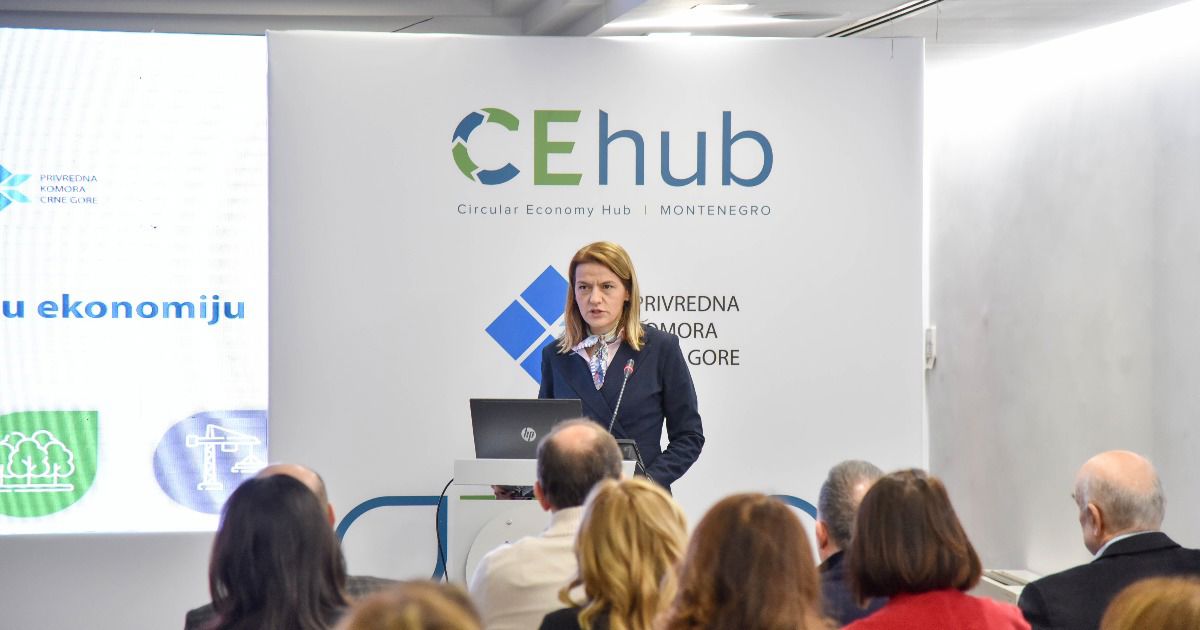
The Chamber of Economy of Montenegro is a business association, established almost a century ago, whose membership extends to all companies in Montenegro. Its main goal is the improvement of the business environment in the country and its economic development. Realising the importance of the shared mission of promoting sustainable business practices, the Chamber has supported the ESG Adria Summit 2024 as a bronze sponsor.
The Chamber relies heavily on the postulates of circular economy, as integral components of ESG, particularly in terms of the strategies being developed within companies.
“Circular economy postulates are the main enablers for sustainable business practices. By embracing them, the businesses can definitely minimise their environmental footprint, either through reduced resource consumption, using less energy, or generating less waste. That’s why, at the Chamber of Economy of Montenegro, we’ve adopted these postulates as the main drivers of the future economic development of Montenegro”, said Nina Drakić, the President of the Chamber.
Thanks to the Chamber’s orientation toward adoption and implementation of circular economy standards, companies under its umbrella could also benefit by learning how to mitigate potential environmental risks, especially in sectors vulnerable to climate change like agriculture, or tourism. And these are some of the key segments for the development of the Montenegrin economy.
“The circular economy also creates opportunities for social impact by fostering innovation within the community and supporting local initiatives. However, this is not an easy task, as sustainability and the circular economy are rarely built into every product and project. It requires focused effort and planning, which is what our institution has endeavoured to do with the Circular Economy Roadmap developed in collaboration with UNDP and our expert partners”, Ms Drakić added.
This document has jump started a shift toward circular economy in Montenegro and resulted with the development of the National Strategy of Circular Transition, the further incorporation of circular economy principles into financial mechanisms and ultimately, the establishment of a Circular Economy Hub.
The idea behind the Hub is for it to serve as a central resource storage for everything ‘circular’ and offer companies, members of the association to share and gain knowledge to introduce circular principles into their business operations. On top of that, the Chamber is focusing its efforts to educate and utilise horizontal enablers of the circular economy process, particularly innovation. Because, innovation can lead businesses to create products and processes that foster more sustainable outcomes, even in smaller countries like Montenegro.
Thanks to the Circular Economy Roadmap, the Chamber was able to identify and put into motion several measures that would facilitate the country's transition to a circular economy. Specifically, the creation of policies and a regulatory framework supporting this transition has been initiated through the establishment of the National Strategy on Circular Transition. It will be further supported by the adoption of relevant laws, such as the Law on Waste Management, to whose drafting the Chamber actively contributes to.
Simultaneously, the document identifies the need for direct actions towards supporting resource efficiency by promoting resource optimization and prioritising reuse, recycling and remanufacturing. Similarly, reforming public procurement processes to incentivize the demand for sustainable products and services, and fostering partnerships among various stakeholders to drive collective action, while also enhancing public awareness and cultivating a circular culture, are crucial measures that must be implemented for the success of this process.
That said, through this document, several challenges for this process have also been identified. For instance, Montenegro faces potential resource scarcity and relies on imports a great deal. Therefore, the adoption of these principles is even more strategic, to avoid resource insecurity, foster innovation, safeguard environment and biodiversity and motivate the establishment of new businesses.
Over the past several years, the Chamber has been highly active in developing and implementing various local and international projects. These projects have been extremely beneficial to both the Chamber and its membership and local communities. They have helped develop skills within their own team and gain the technical knowledge necessary for successfully completing each project. Additionally, they have enhanced the understanding of various topics and facilitated the sharing of best practices in areas where there were gaps.
One of such programs is also the “Snaga je u (svima) nama” campaign. The goal behind this initiative is to strengthen the domestic economic subjects and entrepreneurs, increase their visibility, but also the awareness about the importance of the Montenegrin business community.
In addition to the development of the Circular Economy Roadmap, the Chamber of Economy has participated in regional projects such as Circular Economy Western Balkans Beacons, BLUEfasma and BLUEair, which focus on sustainable fishing practices. Moreover, it’s actively engaged in the Task Force on Green Transition within the WB6 Chamber Investment Forum, serving as a member of the National Council on Sustainable Development and contributing to the establishment of the first doctoral program on sustainable development at the University of Montenegro.
“All of these examples demonstrate the dedication of the Chamber of Economy of Montenegro to the sustainable practices and importance of their work toward inspiring others to follow in this path. We extend our gratitude to them for joining us at the ESG Adria Summit 2024 and supporting our mission of bringing sustainability to the whole Adria”, said Biljana Braitwaite, the CEO of Sustineri Partners, organiser of the ESG Adria Summit.